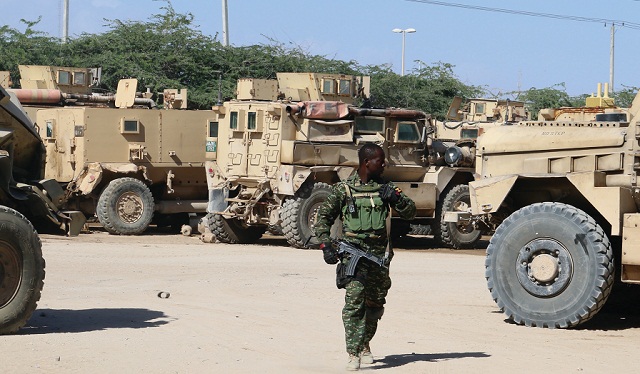By THE INDEPENDENT UG
Lessons from the US war in Afghanistan for Uganda’s mission in Somalia and Israel’s in Gaza
THE LAST WORD | Andrew M. Mwenda | While thinking about Uganda’s involvement in Somalia sometime last year, I read Craig Whitlock’s book, The Afghanistan Papers, The Secret History of the War. Just after I had finished it, Israel launched its war on Gaza whose stated aim is to “destroy Hamas once and for all.” Then I reread David Fromkin’s classic essay published in Foreign Affairs in 1975 titled “The Strategy of Terrorism.” Fromkin argues that terrorists do not achieve their objectives using terror. Rather they use terror to induce governments to overreact and make self-destructive mistakes. Yet I don’t think Israel has fallen into such a Hamas trap. Rather Hamas as furnished Tel Aviv with the perfect pretext to carry out its political aims.
But let us first turn to The Afghanistan Papers. The U.S. invaded that poor country apparently to fight and eliminate Al Qaeda, a terrorist group responsible for the horrible attacks on September 11, 2001. But in a moment of misguided hubris, it also decided on two other broader strategic objectives. The first was to remove from power the Taliban government that had given Al Qaeda sanctuary. The second was even more grandiose: to rebuild Afghanistan into a modern, secular, liberal democratic state.
As Whitlock argues, America had jumped into the war with a hazy idea of whom it was fighting. The U.S. also made yet another blunder by blurring the line between Al Qaeda and the Taliban. The two groups shared an extremist Islamist ideology and a mutual support pact. But they had different objectives and goals. Al Qaeda was largely a group of Arabs pursuing a global jihad. The Taliban were a local, largely Pashtun, political organisation whose main aim was to consolidate power in Afghanistan.
Initially, the U.S. and her allies seemed victorious. They had deposed the Taliban and began hunting and killing suspected Al Qaeda and Taliban leaders. But by 2003, the Taliban were resurgent – just as the U.S. was plunging into yet another Muslim country, Iraq, to remove a “dictator” and establish a liberal democracy.
By 2006, both occupations had become a quagmire. A brutal insurgency had buried U.S. hopes for democracy in the blood-soaked sands of Iraq. The smoldering edifice of a state and the fledgling government Americans has installed in Afghanistan could only, and partly, govern Kabul. This is the situation Uganda confronts in Somalia today; a resurgent Al Shabab that in 2012 seemed defeated when it left Mogadishu. It also mirrors the unsolved question of South Sudan.
Critics of President George Bush, especially then-Senator and presidential candidate, Barack Obama, attributed U.S. failure to poor prioritisation.
The war in Iraq was a war of choice, Obama argued. It distracted the U.S. from focus on Afghanistan, a war of necessity. Upon assuming power, Obama drew down U.S. troops in Iraq and increased U.S. troops in Afghanistan.
In his insightful 2013 essay in Foreign Affairs titled The Limits of Counter Insurgency Doctrine in Afghanistan; The Other Side of Coin, Gen Carl Eikenberry says that by 2010, America had 100,000 combat troops in Afghanistan costing $100 billion a year. But the Taliban were growing. Eikenberry had been U.S. military commander in Afghanistan under Bush and later became ambassador to the country under Obama.
Americans in both Iraq and Afghanistan, like Ugandans in Somalia, had very humane counter insurgency strategies and noble, albeit naïve, aims. The U.S. and Uganda share a counter insurgency doctrine that emphasises winning hearts and minds of the local population. Both UPDF and the U.S. army seek to treat the local population as allies in the struggle against terrorist. Hence the Americans in Afghanistan poured large sums of money into building schools, hospitals, roads, dams, and bridges. They also promoted gender equality, building a justice system (albeit on Western conceptions of justice), training local police and a local army. They built working relations with many local Afghan ethnic, religious and business leaders. Despite such good intentions, plus lots of American blood, treasure and time, the Taliban kept growing.
Now imagine the fate of Israel in Gaza. Tel Aviv does not see any distinction between Hamas and the Palestinian people. Some may be hostile to Hamas and thus potential allies. Second, it has no political strategy to win the hearts and minds of the Palestinians, all of whom it treats as enemies. Third, it does not have any noble aims to build a democracy in Gaza or provide any public goods and services to the people. Instead, it starves them of food, water, medicines, electricity and other necessities. We can, therefore, easily read its political aims from its military strategy. Clearly, Israel’s strategic aim is to grab the entire Gaza and the West Bank by removing Palestinians or reducing their numbers to so low a level that Jews come to enjoy an 80% demographic majority.
Thus, Israel can only win in Gaza if it conducts a comprehensive ethnic cleansing program involving mass evictions, mass starvation and mass killings – that is to say, genocide. Otherwise, short of ethnically cleansing Gaza, its current military strategy can only recruit more Palestinians for Hamas. This will make a military victory impossible in the long term.
Why then is Israel indulging in indiscriminate bombing of hospitals, schools, kindergartens, kiosks, libraries, universities, refugee camps, water supply plants, restaurants, shops, homes, power supply plants, bakeries – to destroy the basis of human existence. Why is it starving Gaza of food, water, electricity etc. Clearly, the aim is to kill Palestinians by bombing and starvation and forcing others to escape to exile. Like it did in 1948. Then Israel will settle Jews in Gaza. Hence, this is not just a war against Hamas but a war against the Palestinian people – a genocide.
We can read Israel’s aims from the script written by Adolf Hitler. Many historians have been intrigued by Hitler’s war in the East. It is in Soviet Russia that Hitler met his waterloo. Almost 80% of German war losses were suffered there. The war on the Western front was a pin prick. Yet there was a chance, slim though it was, that Hitler could have triumphed. But that slim chance was lost in large part because Hitler did not seek to win the hearts and minds of the Slavic people, including Russians, many of whom had initially welcomed Germans as saviors. He considered them subhuman and only fit for liquidation and domination. This very logic drives Benjamin Netanyahu and his ultra-right-wing coalition. Palestinians are a scourge to be eliminated, not partners to work with.
*****

The post Uganda, America and Israel appeared first on The Independent Uganda:.







Discussion about this post